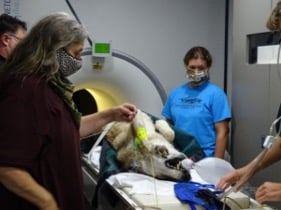North American Bear Center, Dorothy Molter Museum and International Wolf Center are back open, albeit with some changes
FOR IMMEDIATE RELEASE
Three of Ely’s biggest tourist attractions are open to the public after temporarily closing because of the pandemic. The Dorothy Molter Museum, the International Wolf Center and the North American Bear Center have all opened their doors.
Each organization has needed to make adjustments to its daily schedule, of course. Each facility has instituted new cleaning protocols, some also require masks and advance ticket purchases.
After all the changes, though, the experience within each facility is just as memorable as always.
Scott Edgett, the Senior Director of Operations at the bear center, said the response from the public has been incredibly positive so far.
“There have been a lot of changes behind the scenes, but we’re hearing from our visitors that the experience here isn’t diminished at all,” he said. “I’m so proud of the staff here that’s managed to adapt to this new normal.”
At the International Wolf Center and the Dorothy Molter Museum, a new online ticketing system will help ensure there aren’t too many visitors at any one time. The system also makes it possible for visitors to be guaranteed entry after they purchase those advance tickets.
“Moving to the online ticketing system is going to be the biggest adjustment for our visitors,” said Dorothy Molter Museum Executive Director Jess Edberg. “Since we have to limit our capacity to comply with the governor’s orders, this system should help visitors rest easy knowing that they will be able to get in as long as they purchase those advance tickets.”
While each organization was closed, staff members worked hard to get ready for reopening. Sinks were changed to touchless models, as were soap dispensers and hand dryers/towel dispensers. Hand sanitizing stations were tracked down and purchased, which wasn’t easy considering many other organizations were looking for the very same thing. With all of those new safety features in place, doors are reopening.
“We’re so relieved that we’ve been able to come up with solutions that keep our visitors and our staff as safe as possible,” said International Wolf Center Interpretive Center Manager Krista Harrington. “I know that everyone at the Dorothy Molter Museum and the bear center have been hard at work on the same thing.”
All three facilities plan frequent cleaning and sanitizing throughout each day, and each implemented its own Covid-19 preparedness operations plan based on state requirements.
Here’s more information on how each facility plans to operate for the time being:
Dorothy Molter Museum
Advance tickets, available online or by phone, are required for admission to the Dorothy Molter Museum, which celebrates the life of Dorothy Molter. Molter operated the Isle of Pines Resort from 1948 until 1986 and made tens of thousands of bottles of root beer for Boundary Waters Canoe Area Wilderness paddlers.
She lived at the resort year-round. The museum honors her legacy with several of the cabins from her property on site, as well as countless photographs and many of her belongings.
One-hour time slots are available from 8 a.m. until 7 p.m., seven days a week. There is a limit of 10 visitors on-site at any one time.
Masks are required. Disposable masks are available in the gift shop for $1.
Hand sanitizer is available on site.
Changes may be made to this schedule, so visitors should watch the museum’s website for the latest information.
More information about the Dorothy Molter Museum can be found at rootbeerlady.com or by calling (218) 365-4451.
International Wolf Center
Advance tickets are required for admission to the International Wolf Center, too. They are for sale online at wolf.org or by phone.
The Center features a live pack of ambassador wolves, exhibits and lecture-style programs in an auditorium setting.
The Center is open for members only from 8 a.m. until 10 a.m. seven days a week. From 10 a.m. until 3:30 p.m. is general admission. The Center closes between 3:30 and 4 p.m. for a cleaning, then limited group admission is available from 4 to 5 p.m.
Masks are required. Disposable masks are available in the gift shop for $1 and hand sanitizer stations are available.
Changes may be made to this schedule in the coming weeks and months, so visitors should watch the Center’s website for the latest information.
More information about the International Wolf Center can be found at wolf.org or by calling 218-365-4695.
North American Bear Center
The North American Bear Center is open daily from 10 a.m. until 4 p.m. The bear center will operate at 25 percent of its visitor capacity, or 65 people.
Staff will wear masks and cleaning and sanitizing public spaces throughout the day. Hand sanitizer is available. Visitors are encouraged to practice proper social distancing, too.
Changes may be made to this schedule in the coming weeks and months, so visitors should watch the center’s website for the latest information.
More information on the North American Bear Center can be found at bear.org or 218-365-7879.

 FOR IMMEDIATE RELEASE – Once the doors closed at the Ely Bloomenson Community Hospital MRI unit on Sept. 15, a special patient was wheeled into place for a unique MRI. This patient was a wolf.
FOR IMMEDIATE RELEASE – Once the doors closed at the Ely Bloomenson Community Hospital MRI unit on Sept. 15, a special patient was wheeled into place for a unique MRI. This patient was a wolf.